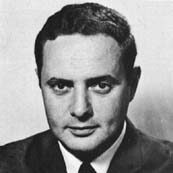Janos Gereben
- 1969

Fellowship Title:
- Social and Political Development in Eastern Europe
Fellowship Year:
- 1969
The View from Budapest
September 1969 Lerchengasse 28/43,1080 Wien, Austria BUDAPEST – The curtain rises in the small hall of Irodalmi Szinpad (Theater for Literature) on the successful, long-running political cabaret, entitled “Viet Rock: Beat Musical.” Five men in blue overalls, five girls in black leotards dance to the beat of authentic American rock on the small, bare, “Second City”-style stage. At the sound of machine guns (which signal each scene change) they all fall down, the men form a line at a small table, and two girls act as doctors at an Army pre-induction physical examination. Sitting under an American flag, the two “doctors” say only one word as each of the five men step up to the table: “Accepted.” The scene dissolves to the waiting room outside where two women are talking about their sons who are now being examined. “They won’t take my son,” brags the first, dressed in feather-covered clothes, signifying that she is a member of the upper class, “I gave them money and we have connections in the Pentagon.” The other woman, obviously
Prague Update
JAN–10/September 1969 Lerchengasse 28/43, 1080 Wien PRAGUE – Walking in this city a month after the August anniversary, one is at loss trying to understand what all the shouting is about. Prague is normal. Kids are back in school, people are shopping along the wide avenues, strolling in the narrow streets of the old city, boating on the Vltava under Hradcany Castle, mobbing street cars, ducking speeding autos on Wenceslas Square. Prague is normal. The Czechs have entered the Hungarians’ post-1956 period. There is acceptance, attention is turned to matters other than politics, there is the business of everyday life. Even the atmosphere of depression, reported here two months ago, has lifted, and there is no other word to describe what Prague is like these days than “normal.” How little newspaper accounts of politics have to do with the way people live! Under the “Prague” dateline, the news of the day in the U.S. and in Western Europe is still about “conservatives and liberals,” “passive resistance,” “repercussions,” and the like. And in Czech papers,
East European Miscellany
JAN-8/September, 1969 Lerchengasse 28/43 1080 Wien, Austria *(No Image Available) PRAGUE: Hradcany Castle from Charles Bridge *(No Image Available) BUCHAREST: These three ladies are substituting for a street cleaning machine, doing their job in close order along the lengths of Bucharest’s wide avenues. (Photos, except post card on p.4, by Janos Gereben) RULING THE WAVES. Radio Prague’s strong, constant broadcasts in every language and to every corner of the world simply defy explanation. Its Afro-Asian broadcasts, for example, feature English and American pop music—so what’s in it for the Czechs? In this corner, wearing white trunks, is Radio Free Europe. While its news and analysis programs have vastly improved in recent years, it broadcasts “modern pop music from the West” to Hungary. It’s very much like Prague’s efforts bringing contemporary American culture to Africans. Budapest’s three radio stations have a heavy schedule of Western pop at all times, making Free Europe’s spending of those “truth dollars” somewhat redundant. FAIR EXCHANGE. Not nearly as wasteful is mighty Radio Tirana, the voice of Albania. Far from the
Mondo Neurotico
(Or, Lines from Freud’s City about the Sickness of the East) August, 1969 Lerchengasse 28/43 1080 Wien, Austria …And the widows of Ashur are loud in their wail, And the idols are broken in the temple of Baal; And the might of the Gentile, unsmote by the sword, Hath melted like snow in the glance of the Lord! Is it possible that Lord Byron will come back to vogue? He does sound most timely these days. While turning to the East from here in Vienna, headlines with Byron’s message continue to intrude from North, West, and South. A Holy War threatened in the Middle East, present-day variations of the wars of the Reformation in Ireland, tribal warfare in Africa, jungle wars in Asia… Is this the same year man reached the moon? Man’s inherent neurosis creates wars, and wars enhance neurosis. The generation of those who were young in World War II—the survivors—are now at the helm. And the ship is… well, there is a good sentence-completion exercise for a slow Sunday afternoon. Obviously,
Possibilities of Regional Development in the Danube Basin – Part II
August 1969 Lerchengasse 28/431080 Wien, Austria BUDAPEST—“Excellent fig wine,” said the Liberal Western Visitor, politely and truthfully. It was really good, if you like that sort of thing and, besides, the situation called for great tact at this strange meeting in the house of some distant acquaintances who were whispered to be Very Convinced Communists. “Oh, it’s all right,” replied the VCC wife, proud manufacturer of the homemade brew, “but the Albanian fig wine is the best.” Eureka, thought LWV, desperately in need of a conversation topic plausible and tactful enough for a VCC-LWV fig wine blast. A good Hungarian Communist must be rather despairing of Albanians whose radio broadcasts daily tell of the “mad dog slaves of Moscow” (that’s Hungarians and other anti- or non-Maoists). ”HEIL ULBRICHT!”—Goose-stepping East German soldiers in front of East Berlin’s Museum for the Victims of Nazism. The settlement of the “German problem” is an obstacle in the path of a Danubian Federation, but the “impossible dream” of a neutral Central Europe may help in the solution of that
